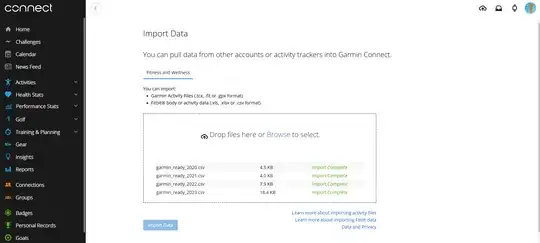Thanks to someone in Reddit, found that it's something like this
Body
weight,bmi,fat,date,time
83.6,24.1,0.0,2020-09-01,08:00:17
82.8,23.9,0.0,2020-09-01,22:02:16
Eventually also found here as well.
So, initially created a simple Python script that reads weight and body composition data from a "zep_life.csv" file,
and converted it into a CSV format that was ready to be imported into Garmin
This time I wasn't getting a warning anymore but it got stuck

as in, nothing seemed to have happend.
I figured it had to do with the size of the file.
So, instead of generating only one file, I generated one file per year and it worked

This was the used script
import csv
import datetime
INPUT_CSV = "zep_life.csv"
def zep_to_garmin_csv():
"""
Reads a CSV file named "zep_life.csv" and writes multiple yearly CSVs named
"garmin_ready_<year>.csv". Each output file has the first line "Body",
followed by "weight,bmi,fat,date,time" as headers. Rows are based on the
'time' field in the input, split by year.
Usage:
1. Place "zep_life.csv" in the same directory as this script.
2. Run this script.
3. For each year encountered in "zep_life.csv", a file named
"garmin_ready_<year>.csv" will be created.
Requirements:
- The input CSV must have the columns: "time", "weight", "bmi", "fatRate".
- "time" must be in a format parseable by datetime.strptime with
"%Y-%m-%d %H:%M:%S%z".
- "fatRate" of "null" or empty is replaced with "0.0".
"""
yearly_writers = {}
with open(INPUT_CSV, mode="r", encoding="utf-8-sig") as fin:
reader = csv.DictReader(fin)
for row in reader:
raw_time = row.get("time", "").strip()
weight_str = row.get("weight", "").strip()
bmi_str = row.get("bmi", "").strip()
fat_str = row.get("fatRate", "").strip()
if not raw_time or not weight_str:
continue
try:
dt = datetime.datetime.strptime(raw_time, "%Y-%m-%d %H:%M:%S%z")
except ValueError:
continue
date_str = dt.strftime("%Y-%m-%d") # "YYYY-MM-DD"
time_str = dt.strftime("%H:%M:%S") # "HH:MM:SS"
if fat_str.lower() in ("null", ""):
fat_str = "0.0"
# If we haven't opened a file for this year yet, do so and write headers.
year = dt.year
if year not in yearly_writers:
fout = open(f"garmin_ready_{year}.csv", "w", newline="", encoding="utf-8")
writer = csv.writer(fout)
# First line: "Body"
writer.writerow(["Body"])
# Second line: headers
writer.writerow(["weight", "bmi", "fat", "date", "time"])
# Store it in the dictionary
yearly_writers[year] = (fout, writer)
# Write the row to the proper year's CSV.
_, csv_writer = yearly_writers[year]
csv_writer.writerow([weight_str, bmi_str, fat_str, date_str, time_str])
# Close all the files
for fout, _ in yearly_writers.values():
fout.close()
print("Done! Split files by year.")
if name == "main":
zep_to_garmin_csv()

